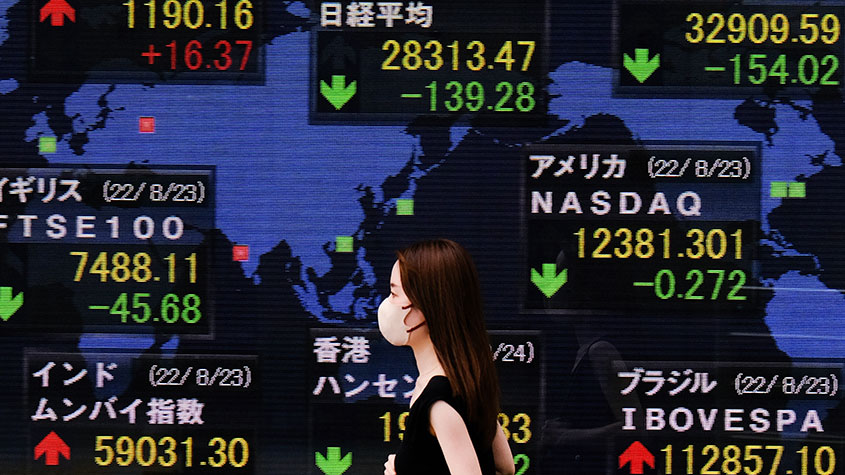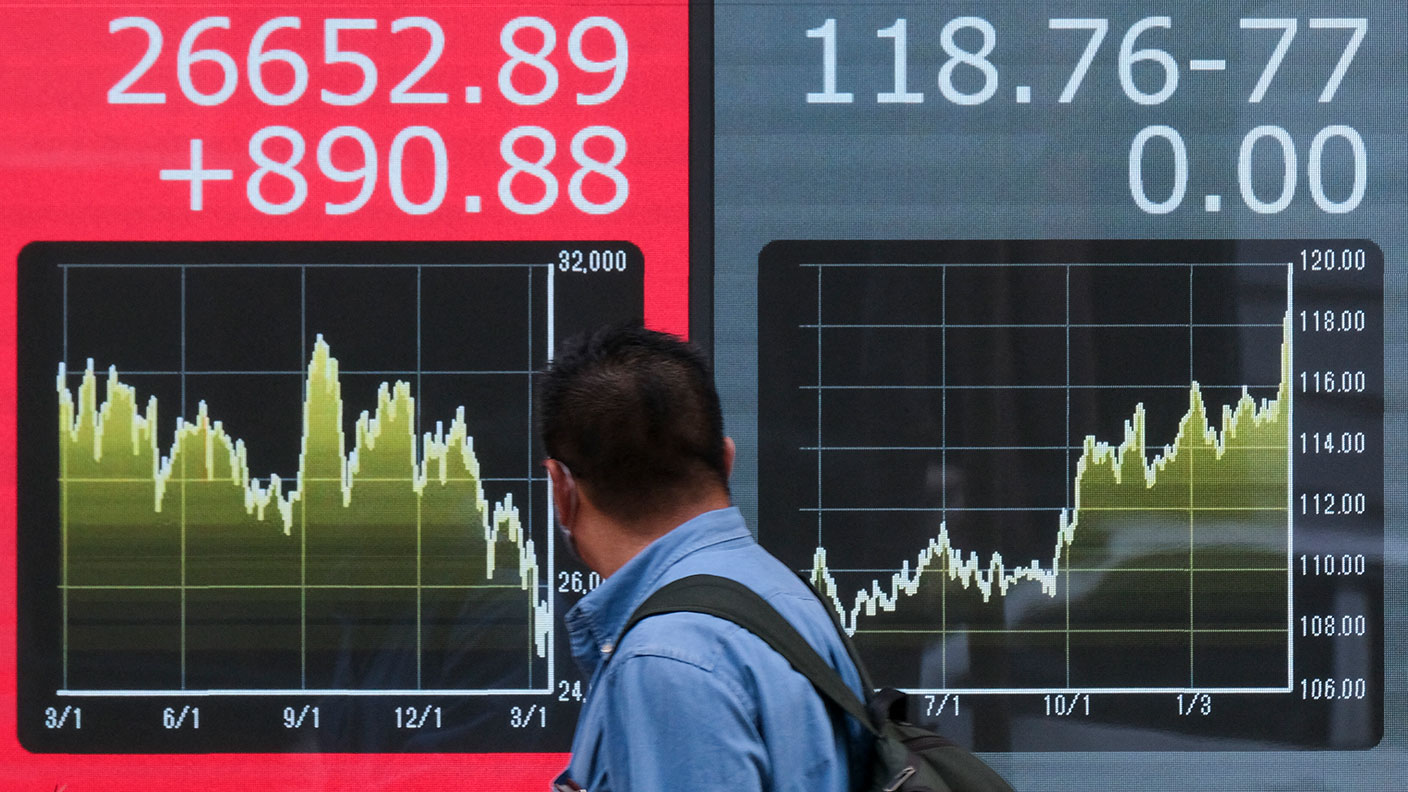Here’s why the idea of a bubble in passive investing is flawed
The idea of passive investing – buying a fund that simply tracks an index – has been growing rapidly in recent years. Some say it's in a bubble. John Stepek disagrees.

Get the latest financial news, insights and expert analysis from our award-winning MoneyWeek team, to help you understand what really matters when it comes to your finances.
You are now subscribed
Your newsletter sign-up was successful
Want to add more newsletters?

Twice daily
MoneyWeek
Get the latest financial news, insights and expert analysis from our award-winning MoneyWeek team, to help you understand what really matters when it comes to your finances.

Four times a week
Look After My Bills
Sign up to our free money-saving newsletter, filled with the latest news and expert advice to help you find the best tips and deals for managing your bills. Start saving today!
One of the guys who made a lot of money by shorting the US mortgage market before the 2008 crisis has been talking about where he sees bubbles today.
Michael Burry (who was played by Christian Bale in The Big Short) reckons that there's a "bubble" in passive investment.
Is he right?
MoneyWeek
Subscribe to MoneyWeek today and get your first six magazine issues absolutely FREE

Sign up to Money Morning
Don't miss the latest investment and personal finances news, market analysis, plus money-saving tips with our free twice-daily newsletter
Don't miss the latest investment and personal finances news, market analysis, plus money-saving tips with our free twice-daily newsletter
The short answer is "no". For the long answer, read on.
Why passive investing makes sense for most people
Let's have a very quick reminder of what passive investing is. A passive fund tracks an underlying index, such as the FTSE All-Share or the S&P 500, say. It doesn't try to beat the market. It just tries to duplicate it.
An active fund, on the other hand, employs a clever manager, or team of managers, to try to beat the market. The aim is to get a bigger return than the market average.
When you put it like that, it sounds like active management is the one to go for, right?
Here's the rub though: the active fund costs a lot more than the passive fund. So before the active manager is worth investing in, you have to be confident that he or she can not only match the return on the market, but then achieve a chunk on top to cover the costs of doing so.
If you could be reasonably sure of finding an active manager who could do that consistently, then maybe active management would still be the best option. Trouble is, very few active managers show an ability to beat the market consistently, and you could argue that those who do, are like lottery ticket winners statistically, while the odds of beating the market are low, someone has to win, and it just happens to be them.
Now, I'm not convinced that outperformance is as random as that. But it's fair to say that choosing a successful active manager is very hard. And it's true to say that the one thing you have complete control over as an investor is your costs.
Therefore, for most people who don't view investing as an enjoyable hobby but as one of life's unfortunate necessities, passive funds make a lot of sense.
And the message has been getting through. The proportion of funds in the stockmarket in particular that are invested passively has been growing rapidly in recent years. It's most advanced in the US, but passively managed assets constitute an ever-growing chunk of the investment universe across the globe.
Is there a bubble in passive investing?
So, is this a bubble, as Michael Burry suggests? (To be fair to Burry, this wasn't his main point in his email interview with Bloomberg he was more talking about his adventures as an activist investor in South Korea but it's a good talking point to dissect.)
I'm open to the idea that passive investing might be distorting capital flows to a certain extent. I'm open to the idea that it might be pumping a lot of money into some high-profile, highly-liquid companies at the expense of smaller ones, which is basically Burry's argument (he runs a small-cap value fund, so yes, he would say that).
And I'm certainly open to the idea that some of the financial instruments being marketed under the "passive" banner are overly-complicated and primed to blow up. We're not talking about S&P 500 trackers here, we're talking about small exchange-traded funds designed to exploit aggressively data-mined clusters of "factors" that turn out not to exist the minute that anyone tries to make any money from them.
(Quick plug I cover this idea of a passive bubble a lot more in my book, The Sceptical Investor.)
But to call it a bubble is going way too far. A bubble implies that there's a mania for getting rich here. Instead, this just looks to me like an old-fashioned competitive price war. Investing is getting cheaper, and the folk who charge more don't like it.
You have to remember who are these passive funds taking money from? Are they really pulling cash out of successful actively-run funds in order to put it into index funds? Are they really taking money away from managers who are good at allocating capital? I'm not convinced.
I'll admit that I don't have the figures to back this up, but does it make any logical sense that people would be yanking their cash out of a highly-successful active manager (and investment trust) Scottish Mortgage Trust, say, in order to stick it into an S&P 500 tracker? I don't think so.
Instead, I suspect that the active managers who are losing out are the ones who were mostly closet trackers or perennial under-performers. In other words, passive investing is simply a cheaper, better version of the active funds that were doing virtually the same thing but at a higher price.
Indeed, as Josh Brown argues on his Reformed Broker blog, you could say that the real bubble was in the idea of "star" fund managers. "The 20-year period from 1987-2007 was the real aberration. What's happening now is a reversion to normalcy."
Where is the industry looking to make fat fees these days?
What is interesting is to consider the impact that all of this competition from the passive industry is having on active investors. I do wonder how much of the growing tendency for companies to stay private for longer, alongside the rush of funds into private equity, has been influenced by the rise of passive investing.
The active industry now has fewer reasons to hype equity markets. The argument there has been comprehensively lost. So if you want to sell financial services to investors, you have to find a new asset class to gatekeep.
Instead, these days, we hear a lot of hype around expanding access to private equity for individual investors. Funnily enough, not only can you charge a lot for private equity, but you are also far less painfully at the mercy of "mark to market" than an active fund that invests in listed equities.
A cynic could argue that if you're looking for a new pup to sell investors, then private equity is ideal.
If we're looking for bubbles, then maybe we should be looking at where the brutal price competition from passive investing is chasing the promoters and the managers who still want to make their fat fees.
That's a story for another day.
Get the latest financial news, insights and expert analysis from our award-winning MoneyWeek team, to help you understand what really matters when it comes to your finances.

-
 Should you buy an active ETF?
Should you buy an active ETF?ETFs are often mischaracterised as passive products, but they can be a convenient way to add active management to your portfolio
-
 Power up your pension before 5 April – easy ways to save before the tax year end
Power up your pension before 5 April – easy ways to save before the tax year endWith the end of the tax year looming, pension savers currently have a window to review and maximise what’s going into their retirement funds – we look at how
-
 What is an index fund?
What is an index fund?Glossary We outline everything you need to know about index funds, from what they are and how to buy them, to the things to consider before you do so.
-
 Low-cost index funds for simple investing
Low-cost index funds for simple investingTips Index funds are an easy, low-cost way for investors to invest in a sector or asset class. Here’s a selection of the cheapest passive tracker funds on the market right now
-
 A core US fund that should be part of every portfolio
A core US fund that should be part of every portfolioAnalysis The UK market’s recovery might not be here to stay. America offers a compelling alternative, says Max King.
-
 Three healthcare trusts to invest in
Three healthcare trusts to invest inAnalysis The biotech sector is in its biggest bear market in 30 years. But Max King explains why this sector could turn around soon and three healthcare trusts that may be worth investing in.
-
Investment trust portfolio update March 2022: things take a turn for the worse
Analysis Merryn Somerset Webb looks a how MoneyWeek’s model investment trust portfolio has fared as markets swing from growth to value.
-
 Looking for Isa season ideas? Load up on investment trusts
Looking for Isa season ideas? Load up on investment trustsSponsored Investment trusts have had a poor start to the year. But, while there are still plenty of risks, there are plenty of opportunities too. Max King looks at the sectors to buy.
-
 The globally-focused investment trusts to buy for great returns
The globally-focused investment trusts to buy for great returnsTips The bullish market outlook means investors should opt for investment trusts targeting the world’s great companies, says Max King. Here, he picks some of his current favourites.
-
 Two small-cap funds with big potential
Two small-cap funds with big potentialTips Two investment trusts concentrating on US small-cap shares offer excellent long-term value.